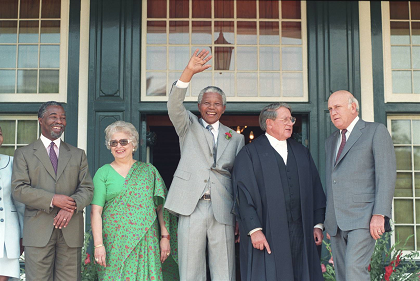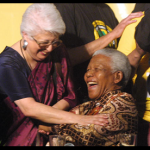Frene Noshir Ginwala, best known as the first speaker of South Africa’s democratic parliament, died at age 90, on 12 January, 2023, at her home in Cape Town. South African President Cyril Ramaphosa declared seven days of official mourning, with the national flag flown at half-mast around the country until the evening of 24 January, 2023. “We have lost another giant among a special generation of leaders to whom we owe our freedom and to whom we owe our commitment to keep building the South Africa to which they devoted their all,” said Ramaphosa.
Ginwala was larger than life in the political firmament of South Africa. It was the cumulation of her unique family background, her stellar role in South Africa’s anti-Apartheid movement, and her later political career in an independent South Africa.
Ginwala was born on 25 April, 1932, into a wealthy Parsi Zoroastrian family. Her grandparents had immigrated to Johannesburg, South Africa, from western (British) India in the 19th century. This was unlike many Indian South Africans who are descendants of indentured laborers brought from India to Port Natal by the British to build the railways and to farm the sugarcane plantations between 1860 and 1911.[1] The Ginwalas were, then and now, among the very few Parsi families in the Indian community in South Africa, which mostly comprised of Hindus and Muslims. After completing her schooling, Ginwala went to London, graduating with a bachelor’s in law.
In a 2014 interview with the South African national broadcaster, SABC, Ginwala said her “political consciousness was created by her parents, who were always reminding her and her sister that they were privileged.” [2]
Upon her return home, it was natural that she joined the anti-Apartheid movement as a young activist of the African National Congress (ANC). The ANC had developed as a liberation movement against racial discrimination of Black South Africans that had been institutionalized by Apartheid laws enacted by the white-ruled South African government. Apartheid was also imposed on Indians, Asians – every other race other than white.
Following the Sharpeville massacre – a demonstration that turned violent when police shot an estimated 69 people in 1960[3] – the Apartheid government declared a state of emergency, banning the ANC and other anti-apartheid organizations. This move forced ANC members to go into exile.

Ginwala left South Africa after helping Oliver Tambo across the border into Southern Rhodesia, he later went into exile in the UK. She proved to be an asset to the functioning of the exiled ANC for 30 years, assisting ANC operations, outside of South Africa. Ginwala utilized every minute in favour of her mission. In her absence from South Africa, Ginwala worked as a part-time journalist for London’s Guardian[4] and other publications like the UNESCO Courier, writing on issues of apartheid and gendered racism/oppression. At the request of then Tanzanian President Julius Nyerere, Ginwala was appointed the managing editor of the Tanzanian newspaper, the Standard. However, Ginwala’s experience was turbulent and she was subjected to extensive pressure from the Tanzanian government for being too critical. Her time at the Standard lasted less than eighteen months.
She obtained a Doctorate in History from the University of Oxford, United Kingdom, and served as ANC spokesperson on sanctions and the arms and oil embargo on South Africa.[5] In 1985, Ginwala’s commitment to fighting gender inequality was in the spotlight at the Nairobi Conference of the United Nations Decade for Women, where she was joined by ANC’s top women Ruth Mompati and Gertrude Shope. The purpose of the conference was to appraise the accomplishments of the UN Decade for Women and the adoption by consensus of a final document, the Nairobi Forward-Looking Strategies for the Advancement of Women. The ANC women wanted to reassert that there could not be “women’s liberation without national liberation.”[6]
In 1990, after the 30-year ban on the ANC was lifted, Ginwala finally returned home to South Africa in 1994. After Nelson Mandela became the first democratically elected president, he appointed her as South Africa’s first Parliamentary speaker. She served as Speaker of the National Assembly from 1994 until 2004. In April 2005, Ginwala was appointed as the first chancellor of the University of KwaZulu-Natal.
Ginwala’s contribution was acknowledged at home and worldwide. She received numerous awards like South Africa’s Order of Luthuli in Silver for her “excellent contribution to the struggle against gender oppression and her tireless contribution to the struggle for a non-sexist, non-racial, just and democratic society”, the Order of the Rising Sun from Japan for exceptional service to the state, and India’s Priyadarshni Academy award in 2000 for “outstanding contribution for Promotion of Human Rights and Democracy”.
South African President Cyril Ramaphosa, said in his official address at Ginwala’s memorial service: “Good thoughts, good words, and good deeds. These are the tenets of the Zoroastrian faith into which Frene was born. She lived by them. Her life embodied them.”[7]
We join South Africa in bidding goodbye to Frene Noshir Ginwala.
Sarah Kropf is Research & Editorial Intern, Gateway House.
This article was exclusively written for Gateway House: Indian Council on Global Relations. You can read more exclusive content here.
For permission to republish, please contact outreach@gatewayhouse.in
© Copyright 2023 Gateway House: Indian Council on Global Relations. All rights reserved. Any unauthorised copying or reproduction is strictly prohibited.
References
[1] Tayal, M. 1977. Indian Indentured Labour in Natal, 1890-1911. The Indian Economic & Social History Review, 14(4).
[2] https://www.news24.com/news24/behind-the-icon-frene-ginwala-the-speaker-of-truth-to-power-20150429
[3] Ellis, S. 2011. The Genesis of the ANC’s Armed Struggle in South Africa 1948-1961. Journal of Southern African Studies, 37(4).
[4] Roberts, G. (2022). Decolonising the Media: Press and Politics in Revolutionary Dar es Salaam. In Revolutionary State-Making in Dar es Salaam: African Liberation and the Global Cold War, 1961-1974 (African Studies, pp. 203-236). Cambridge: Cambridge University Press.
[5] The Presidency, Republic of South Africa. Frene Noshir Ginwala, <https://www.thepresidency.gov.za/national-orders/recipient/frene-noshir-ginwala-1932>
[6] Hassim, S. 2004. Nationalism, Feminism and Autonomy: The ANC in Exile and the Question of Women. Journal of Southern African Studies, 30 (3).
[7] South African Government, President Cyril Ramaphosa: Official Memorial Service of Dr Frene Ginwala, 24 January 2023, < https://www.gov.za/speeches/president-cyril-ramaphosa-official-memorial-service-dr-frene-ginwala-24-jan-2023-0000>.
Image credits: Gallo Images/Oryx Media Archive


